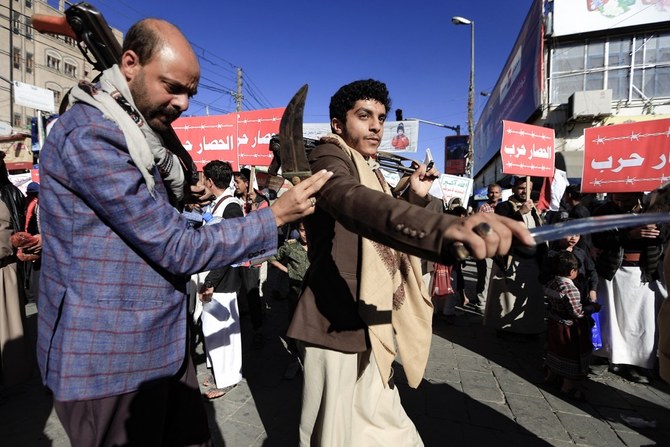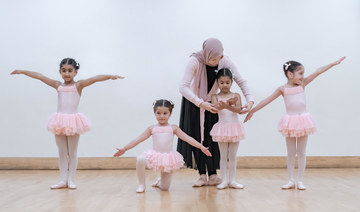DUBAI: Save the Children is suspending its operations in northern Yemen after one of its staff died in detention in the country’s rebel-held capital, it said on Thursday.
Father-of-four Hisham Al-Hakimi, who worked as the group’s Safety and Security Director, was detained on September 9 while off duty, the British charity said.
“No charges or legal proceedings were filed by authorities or reason given for his detention in” Sanaa, which is controlled by Iran-backed Houthi rebels, the charity said in a statement.
It did not provide details on the circumstances or cause of death of Hakimi, 44, who joined the organization in 2006.
“Save the Children will be suspending operations in northern Yemen with immediate effect,” the charity said.
Yemen erupted into conflict in 2014 when Houthi rebels seized Sanaa, prompting a Saudi-led military coalition to intervene the following year to prop up the internationally recognized government.
The war has triggered one of the world’s worst humanitarian tragedies, with two-thirds of the population currently requiring humanitarian aid, including more than 11 million children.
From 2015 through 2022, Save the Children reached seven million people across Yemen, four million of them children, according to its website.
The suspension announced on Thursday will halt programs such as health and nutrition, education, child protection, food security and livelihoods in the country’s north, much of which is held by the Houthi rebels.
The charity’s projects in southern Yemen will be unaffected by the suspension.
The move coincides with a deepening humanitarian crisis in the Arabian Peninsula’s poorest country, despite a lull in fighting since a six-month truce expired in October.
Save the Children halts north Yemen operations after staffer death
https://arab.news/gvf3u
Save the Children halts north Yemen operations after staffer death

- The charity’s projects in southern Yemen will be unaffected by the suspension
Yemeni riyal breaks all-time low of 1,770 against dollar

- Local currency trading at 215 to the dollar in late 2014 when war in Yemen broke out
AL-MUKALLA: The Yemeni riyal fell to an all-time low of 1,770 against the dollar on Monday in Yemeni-government-controlled districts, a drop likely to drive up prices and spark violence.
Local money traders and local media said on Monday that the Yemeni riyal was edging closer to a historic record low of 1,800 against the dollar in Aden, Al-Mukalla and other Yemeni districts controlled by the internationally recognized Yemeni government.
In January, the riyal reached a record low of 1,600 against the dollar in government-controlled provinces, two months after it had fallen to a new low of 1,500 against the dollar.
The local currency was trading at 215 to the dollar in late 2014 when the war in Yemen broke out after the Houthis took control of the capital, Sanaa.
It reached an all-time low of 1,700 against the dollar in December 2021, but rebounded to 1,200 after Saudi Arabia injected hundreds of millions of dollars into the central bank in Aden.
The rate of the currency in the Houthi-controlled areas has stayed consistent at 527 against the dollar since late 2016.
The Yemeni government and the central bank in Aden have not commented on the latest drop in the currency, but they usually blame currency speculation by black-market money traders as well as the Houthis, who deprived the Yemeni government of oil revenues by attacking oil terminals in southern Yemen.
In an attempt to control a chaotic market, Adens central bank has previously shut down unlicensed exchange companies, held public auctions to sell the dollar to local food and fuel importers, ordered financial institutions to submit annual statements to the bank, and linked local exchange companies in a unified remittance system under its supervision.
These measures failed to slow the riyal’s devaluation.
The Yemeni riyal used to rebound once a new government was formed or when Saudi Arabia and the UAE made additional deposits into the central bank.
The depreciation of the currency has led to increases in fuel, food and transport costs, forcing millions of Yemenis into poverty, according to local and international aid agencies.
The riyal’s decline in government-controlled provinces of Yemen was attributed to the central bank’s diminishing foreign currency reserves, the cessation of oil exports, and a decrease in remittances from outside the country, according to the World Food Programme’s most recent regular bulletin on food security in Yemen, which was released on Saturday.
The bulletin said, referring to the internationally recognized government of Yemen based in southern Yemen, that the “disruption of oil exports resulted in a nearly $2 billion loss in IRG revenues. The worsening economic situation has also increased food and fuel prices in the south.”
State workers say their wages have not risen in more than a decade and have lost more than 200 percent of their value while prices have skyrocketed.
The devaluation of the riyal has prompted teachers in Yemen’s Hadramout province to go on strike to demand a pay raise.
Taha Bafadhel, a teacher from Ghayel Bawazer in Hadramout, told Arab News that he was currently required to work three jobs to support his family and make ends meet and that educators have fallen into poverty as a result of the devaluation of the riyal and poor salaries.
“The salary has become insufficient to cover a third of the family’s expenses, necessitating additional work to cover the remaining expenses. Even a second job would not meet the expenses,” he said. “The reason for this is the currency collapse, which has resulted in a rise in prices, and also unchanged salaries.”
Palestinians say Israeli forces kill two in West Bank

NABLUS: Palestinian officials said Israeli forces shot dead two Palestinians in the occupied West Bank on Monday, as Israeli police confirmed undercover agents had killed a wanted man in the territory.
The Palestinian health ministry in Ramallah named the dead men as Adam Salahuddin Mansour Faraj, 23, and Mutaz Khaled Sadiq Nabulsi, 28.
Israeli police said undercover officers had killed “a senior wanted man” in the Balata refugee camp near Nablus.
“The undercovers entered the area near the refugee camp in broad daylight and closed in on an event hall where the wanted person was staying,” the force said in a statement.
“As soon as the wanted person noticed the fighters (agents), he started trying to escape on the roof of the building with a weapon in his hand.
“The undercovers killed the wanted person by shooting” on the roof, the statement said, without identifying him.
The incident triggered an exchange of fire between the undercover agents and “armed terrorists in the area who shot at the force and threw explosives,” the police said.
The Palestinian health ministry said Israeli police took one of the bodies with them.
The Palestinian Red Crescent confirmed that two men were killed in an Israeli raid, adding that one belonged to a Palestinian militant group.
Nine others were wounded by Israeli forces in the raid, it added.
The West Bank, which Israel has occupied since 1967, has seen a surge in violence for more than a year, but particularly since the Israel-Hamas war erupted on October 7.
At least 523 Palestinians have been killed in the West Bank by Israeli troops or settlers since the Gaza war broke out, Palestinian officials say.
Attacks by Palestinians have killed at least 14 Israelis in the West Bank over the same period, according to an AFP tally of Israeli official figures.
Ballet Hispanico CEO pleased with well-attended Arab world debut in Abu Dhabi

- Auditorium saw 90 percent attendance over the two-day program
LONDON: The CEO of Ballet Hispanico of New York, which performed its Arab world debut at the Cultural Foundation Abu Dhabi auditorium on Friday, said he was pleased with how well attended the event was, Emirates News Agency, or WAM, reported on Monday.
The ballet company delivered a performance celebrating the fusion of diversity, heritage, and Hispanic culture.
Ballet Hispanico, founded in 1970 by dancer and educator Tina Ramirez in New York, was established to provide opportunities for Latino youth and artists at a time when access to the arts was limited for the community.
Its CEO Eduardo Vilaro told WAM that the auditorium saw 90 percent attendance over the two-day program.
Vilaro said the audience enjoyed a “contemporary show that celebrated the different Latin cultures, with different types of dance movements like classical ballet, jazz and modern forms to create a distinctive movement vocabulary.”
The program began with Pedro Rodriguez’s “Club Havana,” an homage to Cuban culture with West African influences.
Through the Mambo, Cha Cha Cha, Rhumba, and big band music, the story of six couples visiting a club transported the audience to 1950s Cuba.
The performance continued with “Sombrerisimo” by Annabelle Lopez Ochoa, a mysterious and playful work exploring the cultural significance of a hat.
The finale, “18+1,” was an exhilarating ballet set to the music of Perez Prado, the renowned Mexican orchestra leader. Choreographed by Gustavo Ramirez Sansano, it presented the vibrant rhythms of Latin America with a dance infused with humor.
Vilaro said the company’s success lies in its commitment to diversity and multiculturalism, highlighting the importance of embracing different perspectives and ideas.
“As Latinos, we are a fusion of cultures such as African, Spanish, Asian, and others, which gives us a unique perspective celebrating all parts of those diasporas,” he said.
He added that multiculturalism is “important because it teaches us how to be better humans, it is the gateway to unity; if we can be good neighbors in a city, then we should be good neighbors in the world.”
The Abu Dhabi performance was attended by ambassadors from the US, Costa Rica, Spain, and France, along with other diplomats and officials.
Jordanian and Egyptian business leaders discuss investment cooperation

- Primary focus is on challenges related to the entry of Egyptian products into the Jordanian market, vice versa
AMMAN: Members of the Jordan Chamber of Commerce and representatives of Egyptian businesses met in Amman on Monday to discuss ways to foster investment cooperation between their countries.
The primary focus during the talks was on addressing challenges related to the entry of Egyptian products into the Jordanian market and vice versa, the Jordan News Agency reported. Representatives of 23 Egyptian companies visited several Jordanian firms, and the participants also explored the potential for Egyptian products to enter wider Middle Eastern markets through Jordan, and for Jordanian goods to access African markets via Egypt.
Representatives of Egyptian companies acknowledged the importance of the Jordanian market, describing it as a promising platform for entry to other Arab markets.
Ibrahim Al-Nawaiseh, a member of the Jordan Chamber of Commerce’s board of directors who represents the construction and building materials sector, said he was optimistic about the potential for commercial partnerships between businesses from both nations. He highlighted the efforts made by Jordan to strengthen trade relations with Arab countries and mitigate the regional challenges that affect investment and export opportunities.
Al-Nawaiseh also emphasized the high-quality products offered by Jordanian companies in the building materials sector, which he said were competitive with other imports and could meet some of the needs of the Egyptian market. He called for expanded cooperation in the sector, including the exchange of expertise and knowledge to help enhance product quality in both countries.
Khaled Abul Makarem, chairperson of Egypt’s Chemicals and Fertilizers Export Council, described the visit as a significant step toward enhancing trade and economic relations between the two countries, and highlighted the potential for commercial cooperation in the chemicals, building materials, fertilizers, glass, plastic and packaging sectors.
He also underscored the geographic and economic importance of tripartite cooperation between Egypt, Jordan and Iraq, as well as industrial partnerships linking Egypt, Jordan, the UAE, Bahrain and Morocco.
El-Sisi asks Madbouly to form a new government

- Priorities include national security, health and education, political engagement
- El-Sisi’s directives for the new government include continuing economic reforms and increasing local and foreign investments
CAIRO: Egyptian President Abdel Fattah El-Sisi reappointed Prime Minister Mostafa Madbouly on Monday to form a new government after the latter submitted his Cabinet’s resignation.
The president asked Madbouly to form a new administration comprising highly qualified and experienced individuals with a view to achieving multiple objectives.
Priorities include maintaining Egypt’s national security, citizen development in health and education, and strengthening political engagement.
Other important focus areas are improving security, stability, and counterterrorism efforts, along with promoting cultural awareness and national identity, and encouraging moderate religious dialogue to strengthen citizenship and societal harmony.
El-Sisi’s directives for the new government include continuing economic reforms and increasing local and foreign investments.
Other initiatives include promoting private sector growth, controlling price increases and inflation, and monitoring markets as part of the state’s economic development.
El-Sisi has assigned the current government to continue in a caretaker role and perform its duties and tasks until a new government is formed.
El-Sisi wrote on the X platform: “I assigned Dr. Mostafa Madbouly to form a new government that includes the necessary expertise and competencies to manage the next phase to achieve the desired development in government performance and confront the challenges facing the state.”
Madbouly, who has been prime minister since June 2018, thanked the president and pledged to make every effort to serve the country and its people.
Madbouly served as minister of housing, utilities, and urban communities from February 2014 until June 2018.
El-Sisi delegated him to serve as acting prime minister during the medical treatment of Sherif Ismail in Germany from November 2017 to January 2018.






















